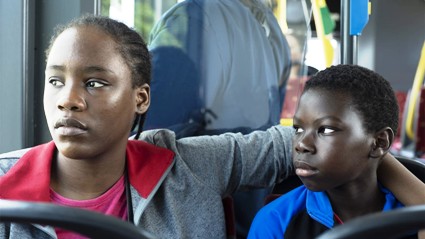 Two young undocumented immigrants from Africa struggle to get by in Belgium, exploited at every turn, and with only each other for support.
Two young undocumented immigrants from Africa struggle to get by in Belgium, exploited at every turn, and with only each other for support.
The Dardenne brothers, Jean-Pierre and Luc, are Belgian filmmakers who’ve been making movies for 45 years. What makes their work distinct is the focus on ordinary, working and middle class characters facing ethical and other dilemmas that reflect problems people are having in the modern world. There is typically no musical score in a Dardenne film. We are meant to experience something close to actuality, when we don’t have music emphasizing our moments. The handheld camera also plays a major role, closely following the characters in their movements, an intimate witness to the immediacy of everyday life. Through sixteen features, I can’t help but marvel at the consistency of their style, in movies that are personal and believable while exploring important themes such as poverty, homelessness, single parents, employee rights, guilt and forgiveness. Well, they just released their seventeenth film, entitled Tori and Lokita. Guess what? It’s one of their best.
The film opens in Belgium with Lokita, a teenage girl from Benin, a country in Africa, answering questions from a woman we don’t see. Lokita claims to have come to Belgium with her brother Tori, who’s already been granted asylum. But the woman questioning her finds inconsistencies in her story: she somehow found her brother after being separated for years—how? Lokita gets stuck trying to answer, and the session ends with her asylum hearing postponed. We then see her with Tori, a young boy, about 12, and it’s immediately clear that they have a deep bond of love and trust between them. Yet fairly soon it becomes clear that they’re not related. They met at some point in the long journey to Belgium, and became attached to each other. It was Tori’s idea to claim that he’s her brother, in an attempt to Lokita her papers that she needs in order to live and work in Belgium.
The Dardennes found two wonderful non-professionals to play their lead characters: Pablo Schils is Tori, and Joely Mbundu is especially good as Lokita: determined but sometimes overwhelmed with feelings, she’s come to rely on Tori’s calming influence to endure the life of a migrant. And what a precarious life they lead. They work for a restaurant owner who happens to be a minor crime boss, using them as couriers in his drug business. Lokita tries to send money to her mother and siblings, but the traffickers who got Tori and her there are still around, harassing them for more money. And of course, the police are always a threat as well.
A crisis is reached when their boss makes Lokita work in his drug factory for three months in exchange for the false papers he’s promised, three months in which she’ll be separated from Tori. But Tori will scramble to find a way to help her.
The film shows us how harrowing and dangerous it is for migrant kids to navigate life under the radar. These two are exploited by everybody around them. But this isn’t some pedantic message picture. It’s a suspense film, more nerve-wracking than most because the characters and their situation seem absolutely true. The Dardennes know how to build tension without sacrificing reality. Tori and Lokita shows the struggle to survive of two young people who have only their deep love for one another to sustain them. It’s not to be missed.

A loner who thinks he’s been cheated by a mortgage firm takes the president of the company hostage, in a story based on actual...

Two young men on a vacation at the shore are surprised that there is a woman renting one of the rooms at their cottage....

A young man with Down Syndrome resists society’s patronizing approach to his life and possibilities, by escaping from a nursing home and going on...